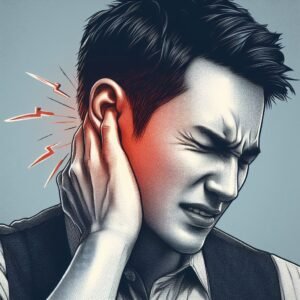In the realm of health mysteries, the association between temporomandibular joint (TMJ) disorders and ear pain often remains elusive to many. Yet, for those grappling with these discomforts, the connection is far from imaginary. Our exploration into this enigma will unravel the intricate web of muscles, nerves, and joints that bridge the gap between the jaw and the ears. Through this journey, we aim to shed light on the question: Can TMJ truly cause ear pain? Join us as we dissect the complexities, symptoms, and potential remedies for individuals seeking answers to the silent culprit behind their ear discomfort.
Key Takeaways
- TMJ disorder can cause ear pain due to the proximity of the joint to the ear
- Causes of TMJ-related ear pain include misalignment of the jaw joint, excessive teeth grinding or clenching, arthritis in the temporomandibular joint, trauma or injury to the jaw or surrounding areas, and inflammation or swelling of the jaw joint and surrounding tissues
- TMJ-related ear pain is a result of TMJ dysfunction, not a direct ear issue
- Treatment options for TMJ and ear pain include pain medication, muscle relaxants, oral splints or mouthguards, physical therapy exercises and techniques, and stress management techniques

TMJ Disorder Explained
If you’re experiencing ear pain, it could be a result of TMJ disorder. TMJ, or temporomandibular joint, is the joint that connects your jawbone to your skull. When this joint becomes inflamed or damaged, it can cause a variety of symptoms, including ear pain.
The TMJ disorder is often caused by teeth grinding, jaw clenching, or an injury to the jaw. The pain is usually felt in front of or around the ear and may be accompanied by clicking or popping sounds when you open or close your mouth.
Other symptoms of TMJ disorder include jaw pain, headaches, neck pain, and difficulty in chewing. If you suspect you have TMJ disorder, it’s important to seek medical attention for proper diagnosis and treatment.
Common Symptoms of TMJ
When experiencing TMJ disorder, you may also encounter a range of common symptoms. These symptoms can vary from person to person, but they often include:
- Jaw pain or tenderness
- Difficulty chewing or biting
- Clicking or popping sounds in the jaw joint
- Headaches or migraines
- Facial pain or discomfort
These symptoms can be persistent and affect your daily life. It’s important to pay attention to these signs and seek medical advice if you suspect you have TMJ disorder. Understanding the common symptoms can help you identify the condition and seek appropriate treatment.
In the next section, we’ll delve into the topic of understanding ear pain in TMJ, which is another common symptom associated with this disorder.
Understanding Ear Pain in TMJ
You may frequently experience ear pain as a result of TMJ disorder. This is because the temporomandibular joint, which connects your jaw to your skull, is located near the ear. When the TMJ becomes misaligned or inflamed, it can put pressure on the surrounding structures, including the ear.
This can lead to various types of ear pain, such as aching, throbbing, or sharp pain. Additionally, TMJ-related ear pain can be accompanied by other symptoms like jaw clicking, difficulty chewing, and headaches.
It’s important to understand that the ear pain you experience with TMJ isn’t directly related to the ear itself, but rather the dysfunction of the TMJ.
Seeking treatment for your TMJ disorder is essential to alleviate ear pain and improve overall jaw function.
Causes of TMJ-Related Ear Pain
The underlying causes of TMJ-related ear pain can vary depending on the individual. Here are some possible factors that contribute to this discomfort:
- Misalignment of the jaw joint
- Excessive teeth grinding or clenching
- Arthritis in the temporomandibular joint
- Trauma or injury to the jaw or surrounding areas
- Inflammation or swelling of the jaw joint and surrounding tissues
These factors can lead to the compression or irritation of the nerves connecting the jaw and ear, resulting in ear pain.
It’s important to note that each person’s experience with TMJ-related ear pain may be unique, and a thorough examination by a healthcare professional is necessary to determine the exact cause.
Understanding the underlying causes of TMJ-related ear pain is crucial in order to explore appropriate treatment options.
Treatment Options for TMJ and Ear Pain
To address TMJ-related ear pain, available treatment options focus on alleviating symptoms and addressing the underlying causes.
One common approach is the use of pain medication, such as nonsteroidal anti-inflammatory drugs (NSAIDs), to reduce inflammation and relieve discomfort.
Muscle relaxants may also be prescribed to help relax the jaw muscles and alleviate tension.
In some cases, oral splints or mouthguards can be used to reposition the jaw and relieve pressure on the temporomandibular joint (TMJ).
Physical therapy exercises and techniques, such as stretching and strengthening exercises, may also be recommended to improve jaw mobility and reduce pain.
Additionally, stress management techniques, such as relaxation exercises and counseling, can help reduce stress-related jaw clenching that may contribute to TMJ-related ear pain.
It’s important to consult with a healthcare professional to determine the best treatment approach for your specific situation.
Conclusion
In conclusion, TMJ can indeed cause ear pain. This condition, known as TMJ disorder, can result in various symptoms including jaw pain, headaches, and ear pain.
The ear pain occurs due to the close proximity of the temporomandibular joint to the ear. It’s important to seek proper treatment for TMJ to alleviate ear pain and improve overall quality of life.

Mr. Mark Rogers is independent health investigator with over 25+ years of experience. He’s also a father and past TMJ sufferer. He’s explored numerous treatment options and found the most lasting relief from Neuromuscular Release Therapy. His passions include biohacking, cycling, and spending time with his family. He’s based out of beautiful Atlanta, Georgia. You can find him on his social profiles below.